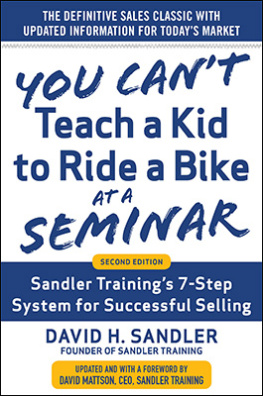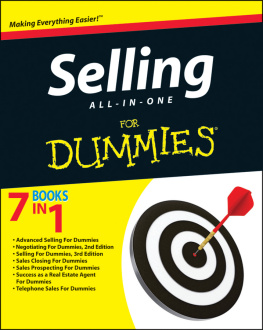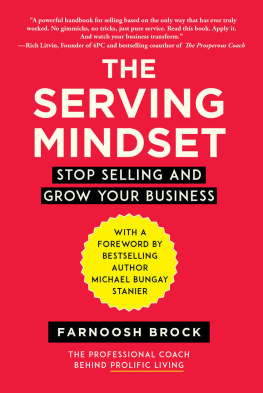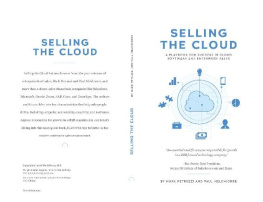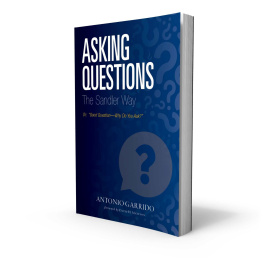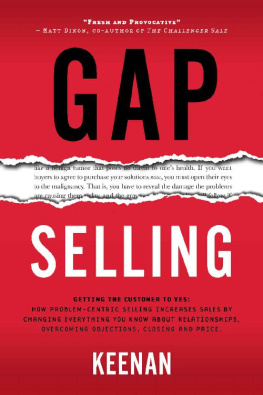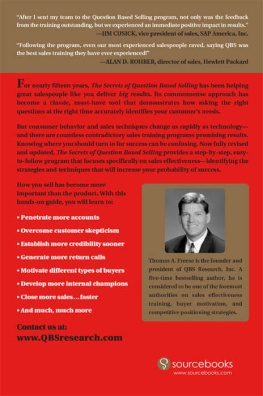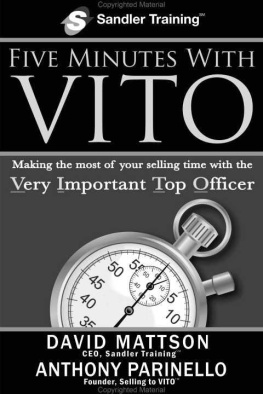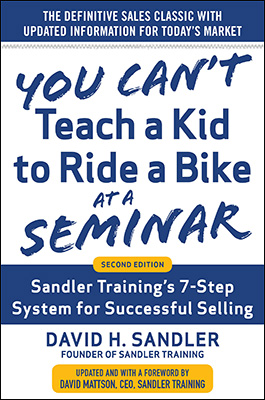David H. Mattson - Sandler Enterprise Selling
Here you can read online David H. Mattson - Sandler Enterprise Selling full text of the book (entire story) in english for free. Download pdf and epub, get meaning, cover and reviews about this ebook. year: 2016, publisher: McGraw Hill LLC, genre: Romance novel. Description of the work, (preface) as well as reviews are available. Best literature library LitArk.com created for fans of good reading and offers a wide selection of genres:
Romance novel
Science fiction
Adventure
Detective
Science
History
Home and family
Prose
Art
Politics
Computer
Non-fiction
Religion
Business
Children
Humor
Choose a favorite category and find really read worthwhile books. Enjoy immersion in the world of imagination, feel the emotions of the characters or learn something new for yourself, make an fascinating discovery.
- Book:Sandler Enterprise Selling
- Author:
- Publisher:McGraw Hill LLC
- Genre:
- Year:2016
- Rating:5 / 5
- Favourites:Add to favourites
- Your mark:
Sandler Enterprise Selling: summary, description and annotation
We offer to read an annotation, description, summary or preface (depends on what the author of the book "Sandler Enterprise Selling" wrote himself). If you haven't found the necessary information about the book — write in the comments, we will try to find it.
The comprehensive 6-stage selling program from Sandler Training
Top 20 Sales Training Company by Selling Power Magazine
Competitively pursuing large, complex accounts is perhaps the greatest challenge for selling teams. To keep treasured clients and gain new ones, you need a system to win business with profitable enterprise clients, serve them effectively and grow the relationships over time.
You start with Sandler Enterprise Selling. The only enterprise selling system based on the proprietary Sandler Selling System methodology created by David H. Sandler This practical, step-by-step book is designed specifically for selling teams committed to high achievement in the enterprise environment. The programs powerful six stages will guide you to:
1. Set a baseline for success for each territory and account
2. Identify opportunities with the highest probability of success
3. Engage with buyers to qualify enterprise opportunities
4. Craft solutions that directly address your clients needs
5. Propose your solution and achieve advancement
6. Serve and satisfy your client, earning the right to grow the business
Each of the stages represents a key piece of the puzzle in the proactive, team-oriented Sandler Enterprise Selling (SES) process. With the proven training techniques in this book, youll be able to use SES to win, grow and serve enterprise clients. Youll learn how to master 13 selling tools integral to your SES successlike the KARE Account Planning Tool, Growth Account Booster Tool, LinkedIn Levers Tool, and Client-Centric Satisfaction Tool. Youll discover practical solutions to the vastly complex challenges in enterprise organizations - extended sales cycles, wide buyer networks, or significant investments in pursuits.
Overcoming these unique challenges presents great opportunities for selling teams. Sandler Enterprise Selling provides the framework needed to succeed in the enterprise arena, winning, growing and keeping major accounts.
Note: These are the same training principles that are taught to tens of thousands of sales executives and managers every year at more than 200 Sandler Training companies around the world. If you want to stay competitive in the enterprise selling arena, you need to train, study, and read Sandler Enterprise Selling.
David H. Mattson: author's other books
Who wrote Sandler Enterprise Selling? Find out the surname, the name of the author of the book and a list of all author's works by series.

